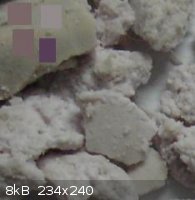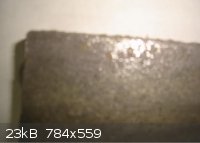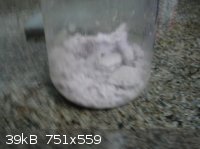| Pages:
1
2 |
Poppy
Hazard to Others
  
Posts: 294
Registered: 3-11-2011
Member Is Offline
Mood: † chemical zombie
|
|
Reason why iron and acid smells bad.
Hi everyone.
I was working with citric acid as a cheap route to a rust remover recipe. After elaving a piece of iron inside lemon juice for a couple hours, I
noticed, when brushing the bar to cleaness, that very same smell of somewhaty sulfurous compounds. what a heck?
There is absolutly no sulfur in lemon juice!
Think iron smells bad on its own!
|
|
|
Fleaker
International Hazard
    
Posts: 1252
Registered: 19-6-2005
Member Is Offline
Mood: nucleophilic
|
|
I've noticed a choking smell when dissolving some metals in acids. Some times it sets on fire. I wonder if it isn't phosphine from phosphorus added to
the melt as a deoxidizing agent.
Neither flask nor beaker.
"Kid, you don't even know just what you don't know. "
--The Dark Lord Sauron
|
|
|
edgecase
Hazard to Self
 
Posts: 65
Registered: 4-11-2011
Location: Ontario, Canada
Member Is Offline
Mood: Viscous
|
|
I believe it is from the sulfide in steel... it is made as cheap as possible, cars and steel buildings are not made from reagent-grade "pure" iron.
http://resources.alibaba.com/topic/800013374/Reasonable_cont...
"Currently, the vast majority of steel production of hot metal sulfur content of less than 0.06%"..."present as MnS"
Given small ppm amounts of H2S smell bad, it's not surprising really.
My other guess would be that since iron is sometimes used as a reducing agent, there might be other reactions?
[Edited on 2012-9-6 by edgecase]
|
|
|
Poppy
Hazard to Others
  
Posts: 294
Registered: 3-11-2011
Member Is Offline
Mood: † chemical zombie
|
|
No to put the oxydation properties or iron aside, but some other substance and I'd put to agree with mr Fleaker. Iron phosphate is present, which only
slight give a little pinch of purple to the crudely extracted from batch
|
|
|
Poppy
Hazard to Others
  
Posts: 294
Registered: 3-11-2011
Member Is Offline
Mood: † chemical zombie
|
|
This gives a clear idea of what I'm talking about.
Image sequence:
1st: A sample o iron phosphate along showing some color
2nd: The so told purple tinged iron
3rd: Colors picked from 2nd photo
4th: bottle containing iron phosphate: actually Fe2O3 dissolve in large excess phosphoric acid
   
|
|
|
Endimion17
International Hazard
    
Posts: 1468
Registered: 17-7-2011
Location: shores of a solar sea
Member Is Offline
Mood: speeding through time at the rate of 1 second per second
|
|
Quote: Originally posted by Poppy  | Hi everyone.
I was working with citric acid as a cheap route to a rust remover recipe. After elaving a piece of iron inside lemon juice for a couple hours, I
noticed, when brushing the bar to cleaness, that very same smell of somewhaty sulfurous compounds. what a heck?
There is absolutly no sulfur in lemon juice!
Think iron smells bad on its own!
|
It was already mentioned somewhere, maybe even a couple of times.
It's a combination of phosphine and hydrogen sulphide, and/or something related. Traces of them, of course.
So was it citric acid or lemon juice? Because lemon juice contains sulphur. After all, it's was a part of a plant. But the smell is related to the
iron impurities. You get the same smell if you etch it with pure phosphoric acid or hydrochloric acid, etc.
|
|
|
blogfast25
International Hazard
    
Posts: 10562
Registered: 3-2-2008
Location: Neverland
Member Is Offline
Mood: No Mood
|
|
With neomagnets (NdFeB) one gets a very meaty, unpleasant smell. Presumably some boranes are added to the alreasy somewhat unsavoury mix.
Someone should verify what smell is obtained with highly pure iron when dissolved in acid, like thermite iron...
|
|
|
AJKOER
Radically Dubious
    
Posts: 3026
Registered: 7-5-2011
Member Is Offline
Mood: No Mood
|
|
Here is a hypothesis, other than H2S, that I am sure escaped most of us. A source ( http://www.water-doctor.com/WD_wellwater.html ) noted that a "Musty, Earthy, Fishy Odor" in water can be attributed to organic matter. Also
mentioned in this context is the presence of bacteria. Per Wiki ( http://en.wikipedia.org/wiki/Iron_bacteria ): "In the management of water-supply wells, iron bacteria are bacteria that derive the energy they
need to live and multiply by oxidizing dissolved ferrous iron (or the less frequently available manganese)."
Also, Wiki notes:
"Clues which indicate that iron bacteria may be present in well water:
Iron bacteria often produce unpleasant tastes and odors commonly reported as
swampy
oily or petroleum
cucumber
sewage
rotten vegetation
musty"
Bottom line, there may be a more 'lively' explanation.
|
|
|
Endimion17
International Hazard
    
Posts: 1468
Registered: 17-7-2011
Location: shores of a solar sea
Member Is Offline
Mood: speeding through time at the rate of 1 second per second
|
|
Living being can't survive in extremely acidic environments of beakers and test tubes, ajkoer.
The smell of iron bacteria, the smell of earth, all that is unrelated to this, and to each other.
|
|
|
AJKOER
Radically Dubious
    
Posts: 3026
Registered: 7-5-2011
Member Is Offline
Mood: No Mood
|
|
Endimion17:
Apparently Iron consuming bacteria love low pHs! In fact, here is a reference, "Hydrometallurgy in extraction processes", Volume 1, by C. K. Gupta,
T. K. Mukherjee, pages 59 to 60, to quote:
"In some operations, the ferrous sulfate solution is left in ponds exposed to the air for several months so that oxidation and hydrolysis take place,
thus regenerating the acid. The overall reaction is:
4 FeSO4 + O2 + 10H2O --> 4 Fe(OH)3 + 4 H2SO4 (Eq 22)
The oxidation of the ferrous sulfate is catalyzed by the autotrophic microorganism Thiobacullis ferrooxidans."
So iron loving bacteria actually create (live in) Sulfuric acid (not your normal bugs).
My alternative hypothesis is that a combination of Iron, acid and the right bacteria, or other organic material (as it is Citric acid) may be
responsible for the smell, and not H2S. Now, I do welcome a debate as long as it is 'lively'.
LINK:
http://books.google.com/books?id=F7p7W1rykpwC&pg=PA60&lpg=PA60&dq=4+FeSO4+%2B+O2+%2B+10+H2O+4+Fe(OH)3+%2B+4+H2SO4&source=bl&ots=fi
SSl16x5f&sig=VsoTmxn
7wDiLNncwWFwZPJB0SYU&hl=en&sa=X&ei=O_ocT-2DDefj0QHM1JixCw&sqi=2&ved=0CGkQ6AEwCQ#v=onepage&q=4%20FeSO4%20%2B%20O2%20%2B%2010%20
H2O%204%20Fe(OH)3%20%2B% 204%20H2SO4&f=false
[Edited on 7-9-2012 by AJKOER]
|
|
|
Poppy
Hazard to Others
  
Posts: 294
Registered: 3-11-2011
Member Is Offline
Mood: † chemical zombie
|
|
Its know even lemon juice, measured pH 2.8, rotten with time, but sulfuric acid is an outrage.
The juice, 3 days old from now, actually is stinking bread. Not sure bread stinks, I love bread!
So its a distinctive smell compared to when iron was submerged. Considering the ammount of cleanised rust, the iron content in the jar are probably
fairly exceeding plant needs already. Maybe the fungus or bacteria are thirsty for more! MORE!
hmm ... smell bread
[Edited on 9-7-2012 by Poppy]
|
|
|
Endimion17
International Hazard
    
Posts: 1468
Registered: 17-7-2011
Location: shores of a solar sea
Member Is Offline
Mood: speeding through time at the rate of 1 second per second
|
|
ajkoer, remember that the pH scale is a logarithmic one. Not one single organism can survive the crap inside our usual chemical reactions with lots of
acid.
They're called extremophiles and acidophiles because they live in relatively acidic environment. Relative to the rest of the nature. There
are volcanic lakes with very low pH in which nothing except those bacteria survive, but that doesn't mean the water is comparable to the broth used
when people clean metal around the house. If you jumped inside such "dead lakes", your eyes and mucus wouldn't be very happy, but you sure wouldn't
experience nasty injuries in few minutes, compared to a swim in battery acid.
Iron bacteria in a typical sized iron bucket would die in a minute if you were to add a teaspoon of concentrated HCl or H2SO4. They are not
extremophiles or acidophiles, but neutrophiles, as their optimum is close to pH 7.
|
|
|
Mailinmypocket
International Hazard
    
Posts: 1351
Registered: 12-5-2011
Member Is Offline
Mood: No Mood
|
|
Quote: Originally posted by Endimion17  | ajkoer, remember that the pH scale is a logarithmic one. Not one single organism can survive the crap inside our usual chemical reactions with lots of
acid.
They're called extremophiles and acidophiles because they live in relatively acidic environment. Relative to the rest of the nature. There
are volcanic lakes with very low pH in which nothing except those bacteria survive, but that doesn't mean the water is comparable to the broth used
when people clean metal around the house. If you jumped inside such "dead lakes", your eyes and mucus wouldn't be very happy, but you sure wouldn't
experience nasty injuries in few minutes, compared to a swim in battery acid.
Iron bacteria in a typical sized iron bucket would die in a minute if you were to add a teaspoon of concentrated HCl or H2SO4. They are not
extremophiles or acidophiles, but neutrophiles, as their optimum is close to pH 7. |
A bit off topic but this may be of interest, Acid Lake in Indonesia.
|
|
|
blogfast25
International Hazard
    
Posts: 10562
Registered: 3-2-2008
Location: Neverland
Member Is Offline
Mood: No Mood
|
|
AJ and Endi:
I don’t believe the odour has anything to do with microbiological activity either. There’s one way of testing it though: sterilise thoroughly and
see if the odour still manifests itself.
|
|
|
Endimion17
International Hazard
    
Posts: 1468
Registered: 17-7-2011
Location: shores of a solar sea
Member Is Offline
Mood: speeding through time at the rate of 1 second per second
|
|
Interesting, I was actually thinking about Kawah Ijen. It's one of the most acidic lakes out there, but the guy is clearly exaggerating. If he put a
can in the lake, and it immediately started to sizzle and bubble (it doesn't even in 70% sulphuric acid or 35% hydrochloric unless it's very hot),
there would be nothing left after half a minute.
If it was thin as a tissue after a lengthy 20 minutes, it sure didn't act as supervillains falling in comic book acid tanks the second he put it in
the lake.
Measuring pH tells us little of the lake composition and it is distracting, not to mention dubious method of determining it (looks like he's not using
an expensive pH meter with a probe).
It's like when people compare the stomach acid and scream about very low pH, acid eating naked the metal of the car body and exaggerating "the power
of body" in a magical fashion, but in reality, it's not that bad.
It would be a pain in the ass (literally, few minutes after your pants get soaked) to swim in this lake, but it's not comparable to a battery acid.
The lake is not a glass beaker, it's a dynamic system with volcano vents delivering SO2 and atmosphere delivering calcium carbonate, to say in the
simplest way. The bottom must be very chalky indeed from all the gypsum formed.
|
|
|
kmno4
International Hazard
    
Posts: 1495
Registered: 1-6-2005
Location: Silly, stupid country
Member Is Offline
Mood: No Mood
|
|
something about "smell of iron"
http://www.sciencemadness.org/talk/viewthread.php?tid=5679&a...
Слава Україні !
Героям слава !
|
|
|
Poppy
Hazard to Others
  
Posts: 294
Registered: 3-11-2011
Member Is Offline
Mood: † chemical zombie
|
|
I still think in some sense the good guy citric acid is still a much stronger acid than even the pareas sulfuric or commonly overreduced HCl acid. For
example, mineral acids wouldn't do any harm to a mosquito, in place, some organic acids can dissolve your body completely from bone to ash.
Pray for the kids in Africa who brings sulfuric acid for us to sniff at home 
I reviewd my color patters in the pictures above and Daltonism is quite not helping now.. Although the camera cuts off a lot of the color tonnes, as
the phosphate is in fact a much strongle evident pink than that.
Has anyone ever experience the taste/ smell of pure iron? People saying silver and iron don't smell by their own. A silver coated flute of mine
(silver with huge surface area), has a smell which is not as strong as that of iron, and theres no way for me to determine how is it coming out.
One thing is made clear though: all metals evaporate!!! They're all slowly vanishing, invisibly to our eyes! Subtle quantum mechanics.
[Edited on 9-8-2012 by Poppy]
|
|
|
blogfast25
International Hazard
    
Posts: 10562
Registered: 3-2-2008
Location: Neverland
Member Is Offline
Mood: No Mood
|
|
Quote: Originally posted by Endimion17  | Interesting, I was actually thinking about Kawah Ijen. It's one of the most acidic lakes out there, but the guy is clearly exaggerating. If he put a
can in the lake, and it immediately started to sizzle and bubble (it doesn't even in 70% sulphuric acid or 35% hydrochloric unless it's very hot),
there would be nothing left after half a minute.
If it was thin as a tissue after a lengthy 20 minutes, it sure didn't act as supervillains falling in comic book acid tanks the second he put it in
the lake.
Measuring pH tells us little of the lake composition and it is distracting, not to mention dubious method of determining it (looks like he's not using
an expensive pH meter with a probe). |
Measuring pH isn’t that meaningless: assuming his measurement isn’t too far off then a pH < 1 does really mean the lake is strongly
acidic, even though that says little about the actual ‘strength’ (a fairly meaningless term) of the acid.
Aluminium does react very vigorously with dilute mineral acids, can aluminium included. Yesterday I was dissolving quite a bit of can aluminium in a
small excess of approx. 15 w% H2SO4 and the reaction was extremely vigorous, partly due also to the solution heating up to BP quite quickly (reaction
heat plus solvation heat).
I doubt that the photo in question was doctored and can easily believe that at pH < 1 the lake water’s attack on an aluminium can would start
very quickly and be very significant.
As regards 35 % HCl, I’m sorry but you’re wrong there. Years ago I had one of these silly accidents involving 35 % HCl and can aluminium. Loading
quite a bit of both into a RBF, I stupidly left the room for a few minutes. By the time I got back I had a strong HCl/H2/steam/Al fountain: the
intensity of the reaction caused strong heating, thus further increasing reaction speed and strongly expanding the hot hydrogen/steam mix! In plain
English: a runaway reaction. To dissolve Al in strong HCl, use a roomy container and add the acid progressively rather than all at once and maybe
provide cooling.
|
|
|
Endimion17
International Hazard
    
Posts: 1468
Registered: 17-7-2011
Location: shores of a solar sea
Member Is Offline
Mood: speeding through time at the rate of 1 second per second
|
|
Quote: Originally posted by blogfast25  | | Measuring pH isn’t that meaningless: assuming his measurement isn’t too far off then a pH < 1 does really mean the lake is strongly
acidic, even though that says little about the actual ‘strength’ (a fairly meaningless term) of the acid. |
Let's use molar concentration instead of "strength". That is directly related to the speed of the reaction. Sulphuric acid is a strong acid, therefore
you don't need a high concentration to reach very low pH, and you can have a strongly acidic lake that's not very reactive in the sense it will gobble
up stuff you throw inside in few seconds.
People tend to mix "very acidic" with "very concentrated" and "very reactive" and that's exploited in his photo article.
One more thing is the temperature which increases the reaction rate. It's around 35 °C (I've found 34 and 36 figures) at the surface in the middle of
the lake where lake temperatures are taken. That's quite warm.
Now take the Sun into account. I wouldn't be surprised for the temperatures at the very coast (lake depth = few centimeters) where he put his can to
be above 50 °C. Might be even 60 °C when all is taken into account.
Putting an aluminium can in a mix of H2SO4 and HCl at pH 0.5, at let's say 55 °C, and seeing the can becomes tissue thin in 20 minutes looks like a
not very concentrated solution to me.
Keep in mind the water height changes over time. In rainy season, it can gain up to 4 meters of fresh water. I don't know when exactly was this guy
performing the experiment.
| Quote: |
Aluminium does react very vigorously with dilute mineral acids, can aluminium included. Yesterday I was dissolving quite a bit of can aluminium in a
small excess of approx. 15 w% H2SO4 and the reaction was extremely vigorous, partly due also to the solution heating up to BP quite quickly (reaction
heat plus solvation heat).
I doubt that the photo in question was doctored and can easily believe that at pH < 1 the lake water’s attack on an aluminium can would start
very quickly and be very significant. |
It never starts immediately (within a second). It takes a while before the oxide layer is sufficiently etched. It can be vigorous, of course, but it
will never start right away. His claim was it happened "as soon as", and that's clearly false.
| Quote: | | As regards 35 % HCl, I’m sorry but you’re wrong there. Years ago I had one of these silly accidents involving 35 % HCl and can aluminium. Loading
quite a bit of both into a RBF, I stupidly left the room for a few minutes. By the time I got back I had a strong HCl/H2/steam/Al fountain: the
intensity of the reaction caused strong heating, thus further increasing reaction speed and strongly expanding the hot hydrogen/steam mix! In plain
English: a runaway reaction. To dissolve Al in strong HCl, use a roomy container and add the acid progressively rather than all at once and maybe
provide cooling. |
Again, I never said it doesn't happen. It doesn't happen immediately, even with concentrated hydrochloric acid. Especially with thicker aluminium like
the one in a can.
Even if you dump Al-foil in it, it still takes few seconds at room temperature and the reaction rate increases exponentially, a true runaway.
Here are quotes from the plateau's homepage.
Ijen crater lake is the most amazing Indonesian lake, representing a solution of sulphuric acid and hydrogen chloride,
the most powerful existing acids. The lake contains 600,000 tonnes of hydrogen chloride, 550,000 tonnes of sulphuric acid, 200,000 tonnes of aluminium
sulphate and 170,000 tonnes of iron sulphate, with an acidity around pH 0.5.
Crater lakes cover active volcanic vents and the water within them is often acidic, saturated with volcanic gases and cloudy with a greenish colour.
Ijen volcano has been hosting an acidic crater lake for at least 200 years. Ijen crater lake is by far the largest acidic lake on Earth, having a
maximum depth of 212 m, and an average depth of 176 m. The Ijen crater lake has a regular oval shape of 600 times 1000 metres.
Of course, "the most powerful existing acids" is for marketing purposes (I mean, come on, they claim that "from every angle, the lake is different, no
shit  ), but let's take the figures into account. ), but let's take the figures into account.
I don't know if the "600 kT of hydrogen chloride" means the gas itself or the concentrated acid, after all it's a tourist webpage. Also, let's not
take the salts into the account, although they are quite acidic themselves.
Oval's surface is a product of the lengths of the both axis and pi. If the lake measures 600x1000 metres, the axes are 300 and 500 metres (Google
Earth photo is obscured by the wind carrying caldera plumes).
The surface is then roughly 471,239 square metres. To determine the volume, we imagine it as a prism and take an average depth which is 176 m, giving
us roughly 83 million cubic metres of lake water, or 83 x10e9 litres.
550 kT of pure sulphuric acid is 5.6122 x10e9 moles of acid, or roughly a cube of sulfuric acid with 66.86 m sides. To visualize the height, here's
one photo.

The smallest the three Great Pyramids, Pyramid of Menkaure, is 61 metres tall with the base around 103 m wide.
5.6122 x10e9 moles divided by 83 x10e9 litres gives us 0.0676 M solution. That's 0.66 w/w. That's even lower than my initial estimate.
It's not even near battery acid. You couldn't drink it, and it would cause a rash and burning sensation after a few minutes of skin contact, but it
can't eat you alive.
I doubt those amounts of "hydrogen chloride" and metallic salts make things much worse.
I'd take a brief swim in the lake. Of course, I don't want a full body rash. Tight waterproof speedos, tight goggles and ton of grease on my skin
would be sufficient. Also, a friend with a water dispenser to give me a brief shower afterwards.
It would be awesome. 
|
|
|
blogfast25
International Hazard
    
Posts: 10562
Registered: 3-2-2008
Location: Neverland
Member Is Offline
Mood: No Mood
|
|
In short, I think you’re being a bit too harsh on the guy. He’s playing with words a little but so are you by resorting to literalism.
As a non-chemist he’s in awe of the acidity of the lake and gets a little carried away. There’s no deliberate attempt at deception or
misinformation, as far as I can discern. The lake is acidic and does dissolve Al, most non-chemists would be impressed by that. He’s more naive than
mischievous. The claim ‘The ph of the lake water is 0.5, similar to the strength of car battery acid’ is inaccurate and somewhat meaningless but
more through ignorance than anything else.
No reaction ever starts ‘immediately’ but with Al/acid that’s generally a matter of seconds. I think you’re a little too hung up on his use of
‘As soon as’. Language is fluid and things rarely mean what they’re supposed to mean literally, devoid of context. How long is a piece of
string?
Personally I am a chemist and find a lake that can dissolve Al cans at a significant rate quite curious, up to the point of impressive.
|
|
|
zed
International Hazard
    
Posts: 2277
Registered: 6-9-2008
Location: Great State of Jefferson, City of Portland
Member Is Offline
Mood: Semi-repentant Sith Lord
|
|
Iron is famous for producing foul smelling, evil tasting water. Yet, the vapor pressure of iron is such, that the iron itself cannot be the actual
source of the odor.
Microbes might be the source though. They love iron. How much do they love it? Well, microbes find iron so delectable, that when your body develops
an infection....it tries to "hide" iron.
Anemia, a common condition, is frequently caused by an undetected low grade infection.
|
|
|
Endimion17
International Hazard
    
Posts: 1468
Registered: 17-7-2011
Location: shores of a solar sea
Member Is Offline
Mood: speeding through time at the rate of 1 second per second
|
|
Quote: Originally posted by blogfast25  | In short, I think you’re being a bit too harsh on the guy. He’s playing with words a little but so are you by resorting to literalism.
As a non-chemist he’s in awe of the acidity of the lake and gets a little carried away. There’s no deliberate attempt at deception or
misinformation, as far as I can discern. The lake is acidic and does dissolve Al, most non-chemists would be impressed by that. He’s more naive than
mischievous. The claim ‘The ph of the lake water is 0.5, similar to the strength of car battery acid’ is inaccurate and somewhat meaningless but
more through ignorance than anything else.
No reaction ever starts ‘immediately’ but with Al/acid that’s generally a matter of seconds. I think you’re a little too hung up on his use of
‘As soon as’. Language is fluid and things rarely mean what they’re supposed to mean literally, devoid of context. How long is a piece of
string?
Personally I am a chemist and find a lake that can dissolve Al cans at a significant rate quite curious, up to the point of impressive.
|
I find the lake to be impressive as well (hey, I'd swim in it  ), but I'm not
used to exaggerate facts about natural phenomena. Here where I live, people are taught to believe they've got "the cleanest sea", "the best fish",
"the greenest forests" etc., to the point of magical thinking combined with nationalism, and it's quite irritating. That explains my reaction. ), but I'm not
used to exaggerate facts about natural phenomena. Here where I live, people are taught to believe they've got "the cleanest sea", "the best fish",
"the greenest forests" etc., to the point of magical thinking combined with nationalism, and it's quite irritating. That explains my reaction. 
[Edited on 8-9-2012 by Endimion17]
|
|
|
blogfast25
International Hazard
    
Posts: 10562
Registered: 3-2-2008
Location: Neverland
Member Is Offline
Mood: No Mood
|
|
A reasonable reaction.
But at the end of the day this guy’s text is a mediocre ‘report’ of a field day: it makes little scientific pretence, other than sounding a bit
‘sciency’ in parts. See also ‘Mythbusters’, ‘Discovery Channel’ etc. I’m a little surprised Wiki linked to that page: there’s nothing
authorative about it.
|
|
|
Poppy
Hazard to Others
  
Posts: 294
Registered: 3-11-2011
Member Is Offline
Mood: † chemical zombie
|
|
Quote: Originally posted by Endimion17  |
I doubt those amounts of "hydrogen chloride" and metallic salts make things much worse.
I'd take a brief swim in the lake. Of course, I don't want a full body rash. Tight waterproof speedos, tight goggles and ton of grease on my skin
would be sufficient. Also, a friend with a water dispenser to give me a brief shower afterwards.
It would be awesome.  |
Yea considering the density you would float as if you were not on earth... Useing a wooden boat could be dangerous, as if it breaks apart is no
safekeeping. Why not just sail aroud with a reinforced boat like those made of aluminium used for fishing? Dude, no need to scuba dive around duh
...you crazy?
I wud put that the dissolved salts may or may not contribute to the overral destructive power of the lake's water. Once I serendiptously mixed 98%
sulfuric, 53% nitric and 35% hydrochloric acids to some special proportion stainsless stel dissolved in it vigorously, without heating. So vigorous
the few mL of what had been prepared bubbled non stop until make its way out the reaction vessel. Seems some equilibrium allowed for the highest
corrosive state(s) of the component acid to be over-actived, something like a constinuously fed excited state.
So, taking 5% percent steps, how many solutions of both 3 acids would be required to probe the once prepared superacid formed, rediscovering it? about
20 tries?
Indeed, on the dissolution of the aluminium can inside the lake a lot of porrly described reactants could raise the very same strange smell of rotten
eggs from the reaction and the site doesn't support enough to tell how.
As for contribution of dissolved salts:
Ca(2+) + 2H2O --> Ca(OH)2 + 2H+ (pH raises)
2H+ + Fe + --> Fe(2+) + H2
Fe(2+) + H2O --> Fe(OH)2 + 2H+
Ca(OH)2 + 2H+ --> Ca(2+) + 2H2O (pH decreases)
In fact metallics cations add's a lot to the corrosive power of the solution, although it doesn't change its acidity.
Seems Al is sometimes contaminated too, its smells horribly whn etched
[Edited on 9-9-2012 by Poppy]
|
|
|
blogfast25
International Hazard
    
Posts: 10562
Registered: 3-2-2008
Location: Neverland
Member Is Offline
Mood: No Mood
|
|
Ca2+ doesn't noticably hydrolyse. You can boil a CaCl2 solution till dryness and all you get is the CaCl2 hydrate.
[Edited on 9-9-2012 by blogfast25]
|
|
|
| Pages:
1
2 |